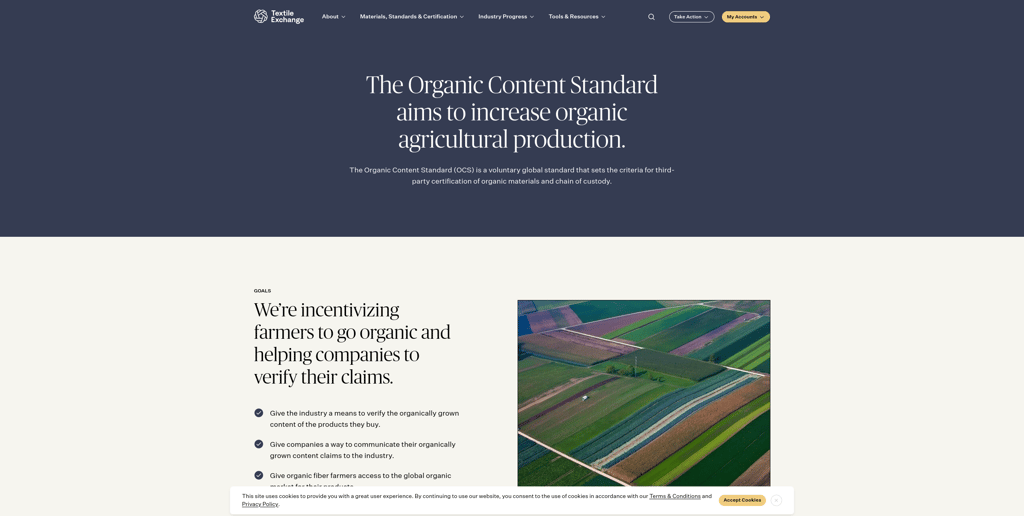What is Organic Content Standard (OCS)?
The Organic Content Standard (OCS) is a global certification program that provides assurance that products are made with a minimum threshold of organic content. It is a voluntary standard that is recognized and accepted by buyers, producers and other stakeholders in the organic marketplace.
The OCS is the only international certification program that requires full traceability of organic materials from farm to finished product. It is designed to provide a high level of assurance that labeled organic products are made with the organic materials they claim, and that they meet or exceed the requirements of relevant organic standards.

Impact on consumers
The OCS provides guidelines and standards to ensure that products labeled as organic meet high quality standards and are produced in an environmentally friendly and sustainable manner. The OCS certification process covers all aspects of organic production and processing, including crop production, animal husbandry, and processing and handling of organic products. It also specifies the use of only organic ingredients and materials in order to guarantee organic integrity.
The OCS is administered by the International Federation of Organic Agriculture Movements (IFOAM) and is recognized by organic certification bodies worldwide. The OCS certification helps to protect the consumer by ensuring that products labeled as organic meet the highest standards for organic production and processing. Consumers can be confident that the organic products they purchase are produced in a way that is not detrimental to the environment or to human health.
By buying OCS certified organic products, consumers are supporting organic farmers and suppliers who are committed to sustainable practices. The OCS certification also helps create a level playing field for organic farmers and suppliers, as it ensures that organic products are produced in accordance with the same standards. This helps promote fairness and transparency in the organic marketplace, as well as greater consumer confidence in organic products.
Guide
The OCS is based on a set of principles that are designed to ensure that organic products are produced in a way that meets the highest ethical, social, economic, and ecological standards. These principles include: respect for the environment, respect for biodiversity, respect for human health and safety, respect for animal welfare, protection of soil health and fertility, promotion of sustainable agriculture practices, and promotion of fair trade.
The OCS is a multi-level certification system that is designed to ensure that organic products meet the highest standards. It involves a set of requirements and procedures that must be met in order for a product to be certified as organic. This includes organic crop production, organic animal production, organic livestock production, organic processing, and organic labeling.
The OCS is designed to ensure that organic products are produced in a way that meets the highest ethical, social, economic, and ecological standards. It requires that organic producers meet certain criteria in order to be certified. This includes the use of sustainable agricultural practices, the use of organic inputs, the use of organic labeling, and the use of organic processing.
The OCS certification process includes a number of steps that are designed to ensure that organic products meet the highest standards. These steps include: verifying the origin of the organic material, verifying that the materials are organic, verifying that the production process meets the standards set out by the OCS, and verifying that the product is labeled correctly.
The OCS certification process also includes a number of verification and inspection processes. This includes inspections of the production facilities, inspections of the organic materials, and inspections of the labeling. The OCS also requires that organic producers provide documentation and evidence that their products meet the standards set out by the OCS.

Sustainable solution
The OCS certification system is designed to provide assurance that certified products are produced using sustainable methods and materials. This includes using organic materials and methods that reduce the impact of agricultural production on the environment. Additionally, it ensures that certified products are produced using ethical labor practices, such as using fair wages and safe working conditions.
The OCS certification system is also designed to ensure that certified products are of high quality. This includes ensuring that the organic materials used are of the highest quality and that the production process is free from any potential contamination. Furthermore, the OCS certification system requires that certified products must meet the highest standards of food safety.
Benefits
Here are some of the key advantages of the Organic Content Standard for businesses.
- Increased Consumer Confidence: With the OCS certification, customers will have greater assurance that the organic products they are purchasing meet the highest standards. This increased consumer confidence can help drive sales and customer loyalty, ultimately boosting your business bottom line.
- Guaranteed Quality: The OCS certification guarantees that all organic products meet the most stringent quality standards. This can help protect your business from the potential risks associated with subpar products.
- Access to a Wider Market: The OCS certification opens up access to a larger market of organic customers, both domestically and globally. This can help your business expand its reach and increase profits.
- Improved Sustainability Practices: By adhering to the Organic Content Standard, businesses can demonstrate their commitment to sustainability. This can help attract more environmentally conscious customers and improve public perception of your business.
Ensuring quality control
The Organic Content Standard covers all aspects of content production, from origin and sustainability to safety and labeling.
The OCS ensures that companies are creating organic content that is safe, pure, and of the highest quality. It sets strict standards for the production of organic content, including rules for labeling and verification. Companies must adhere to these standards in order to achieve the OCS certification.
The OCS also ensures that companies are producing content that is free of contaminants, including chemical and biological agents. It sets strict limits for allowable levels of contaminants and requires companies to test their content for impurities at least once a year. The OCS also requires companies to use only organic raw materials and to follow sustainable production practices.
The OCS requires companies to provide consumers with accurate and up-to-date information about their content. Companies must be transparent about the origin and content of their products, as well as the production process used to create them. This helps to ensure that consumers are aware of what they are purchasing and can make informed decisions.
Conclusion
The Organic Content Standard is a global certification program that verifies the organic origin of apparel and home textile products. It is a rigorous standard that requires third-party inspection, laboratory testing, and traceability of materials to ensure the organic integrity of a product. With the OCS, consumers can be sure that the organic products they buy are of the highest quality and are produced in accordance with strict environmental and social standards.
Reference
- Organic Content Standard (OCS). (n.d.). https://www.intertek.com/assurance/ocs/
- Organic Content Standard (OCS). (2023, January 26). Textile Exchange. https://textileexchange.org/organic-content-standard/